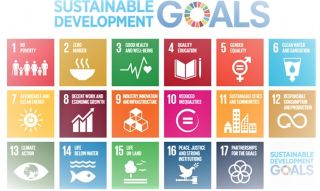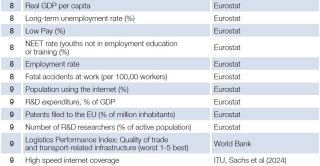Sustainable Progress Index 2025: Economy

The Sustainable Progress Index 2025 comprises of three dimensions, economy, society and the environment. Ireland is ranked joint 7th out of 14 comparable EU countries on the economy index. Although the record on GDP per capita and GDP growth and the score on employment rate is good - the low score on the economy index is influenced by several factors including investment in Research and Development (Ireland has the second lowest rate of investment in R&D as % GDP in the 14 countries examined in the report), and the need for further policy action with regard to transport, logistics (we score lowest on logistics capacity out of fourteen countries). These lower the score on this dimension.
The economy aspect of the SDGs is measured by combining SDG8 and SDG9 with 12 indicators analysed.Despite significant improvement in many aspects of the economy, (for example, the strong performances of GDP, GDP per capita and GDP growth rates have been well documented), our broader measure of the economy shows that there is significant room for improvement. Ireland is ranked joint 7th relative to its EU peers on the Economy Index.
|
The Economy SDG Index – Ranking by Country | ||
Country | Index Score | Country Rank |
Sweden | 0.8527 | 1 |
Denmark | 0.7693 | 2 |
Netherlands | 0.7627 | 3 |
Finland | 0.6603 | 4 |
Germany | 0.5704 | 5 |
Luxembourg | 0.5320 | 6 |
Belgium | 0.4999 | 7.5 |
Ireland | 0.4999 | 7.5 |
Austria | 0.4870 | 9 |
France | 0.3266 | 10 |
Portugal | 0.2689 | 11 |
Spain | 0.2625 | 12 |
Italy | 0.2368 | 13 |
Greece | 0.2048 | 14 |
SDG 8 ‘Decent work and economic growth’
SDG 8 appeals for providing opportunities for full and productive employment and decent work for all while reducing child labour, and human trafficking by promoting labour rights and secure working conditions. The goal recognises that growth is essential for employment (particularly well-paid quality jobs), living standards, and prosperity.
6 indicators are used to compute SDG8. Ireland continues to score highly on GDP per capita (second only to Luxembourg) and we have witnessed steady improvement in economic growth in Ireland. In order to capture the other components of SDG8, (including the theme of ‘decent work’), additional indicators included are: the employment rate, the NEET rate (youths not in employment, education or training), accidents at work, a measure of low pay. The unemployment rate and employment rate fare relatively well, at least compared to the countries in our sample (in the top 5 for both). The NEET rate has also improved and is now at 8.5% in 2023, having fallen from 14.2% since 2022.
Combining all other indicators gives an overall rank for Ireland of 4 on SDG8. The Netherlands, Sweden and Denmark top the ranking.
SDG9 ‘Industry, innovation and infrastructure’
SDG 9calls for building resilient and sustainable infrastructure and promotes inclusive and sustainable industrialization, with the aim of improving living standards. It also recognises the importance of research and innovation for finding lasting solutions to social, economic and environmental challenges.
We draw on 6 indicators to compute SDG9. Expenditure on R&D (as a percentage of GDP) in Ireland is the second lowest of the EU14 at 1.07% in 2023. Sweden, Finland and Austria, Germany and Belgium are the exceptions: they score highest on this indicator and all have expenditure greater than 3% of GDP.
Several other indicators used to reflect this SDG are internet use, and the number of researchers as % of population. These show Ireland performing somewhat better, but there is still significant room for improvement. Ireland’s share of R&D researchers, as % of population has increased over the years but is below the best performing countries. An indicator that attempts to measure the quality of trade and transport-related infrastructure from the World Bank – the Logistics Performance Index, scores Ireland in last place for logistics capacity. Ireland’ score on SDG9 puts it in 10th place overall.
Indicators used for SDG 8 and 9:
